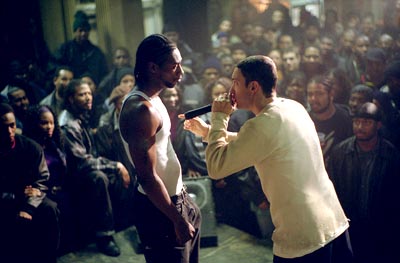When Kevin and I are asked to speak to pre-meds about admissions, people often think of the interview as a high-stress, nebulous obstacle shrouded in enigmatic mysteriousness with a black-boxy finish. To assuage these concerns, and so that future generations of medical students will learn from those who came before, I present a few suggestions for anyone with an upcoming med school interview:
1) Prepare, prepare, prepare:
This one’s obvious, right? In med school interviews, as in “8 Mile,” you only get one shot. You spent weeks/months preparing for the MCAT and years kicking ass in your science courses, during extracurricular activities, and while saving babies in the free health clinic you established in between curing cancer and playing varsity lacrosse for a school that isn’t Duke. That work ethic is what got you to the interview in the first place, so don’t abandon it now. You’d be surprised how often people seem un- or underprepared to discuss the most basic topics they MUST know will be coming down the question pipeline. There is a 105% chance you’re going to be asked why you want to go into medicine, why it excites you, and what experiences led you to the decision that the next 7+ years of training and three subsequent decades of practice are what you want to do with your life. Think about how you’d answer these questions and practice discussing them in some sort of mock interview format. You don’t need a canned script, but if you don’t have a compelling reason why you want the MD, why would the admissions committee make one up for you?
Along these lines, make sure you’re familiar with the specific program for which you are interviewing. Why does the curriculum appeal to you? What’s unique to that school that will help you reach your professional goals and why are your strengths well suited to that school? This stuff is coming, so you might as well prepare for it. Be Eminem vs. Papa Doc, not Proof. (RIP, Proof.)

Your interview should be like this, but less profane and with fewer tanktops.
2) Research the health care system:
This is an extension of (1); you’re entering a system almost universally recognized as broken, with a myriad of significant issues and just as many proposed solutions. As Atul Gawande once said, “The infrastructure and delivery of American health care are wack, yo*.” This issue is all over the news and, more importantly, is going to affect you every day of your professional life. So spending 10 hours reading about our system and its major pros/cons, about the employees who studied in online medical coding courses, nationalized health programs implemented abroad, recent legislation, etc., would be extremely high-yield. And really, it’s not like anyone expects the applicant to solve the health crisis in one hour. Still, it’s reasonable to expect a candidate to be familiar with the major issues of the profession she wishes to enter; it shows the applicant cares and, just as significantly, that she took the effort to prepare for the interview.
3) Be honest:
Adcoms interview a lot of people. They hear a lot of stories and develop a sensitive radar for half-truths and general BS. If you don’t know in what or if you want to specialize, I think that’s fine, but a vague story about how reconstructive surgery is your calling will ring hollow if you have no experiences to back it up. If you get asked a factual question you can’t answer or are asked to discuss something that requires background information you don’t know, it’s better to admit it and ask for what you need or discuss ways you’d obtain the information required than to make stuff up on the fly. No one expects you to have all the answers. If you did, there’d be no need for med school. You’d just stop by the front desk for a white coat and board certification and be on your life-saving way.
4) Be engaging:
An interview is as much about figuring out who you are and how you interact with others as it is a discussion of your credentials / experiences. An interview is inherently subjective. Think about what types of interviewer-interviewee discussions would positively resonate with an interviewer when he or she evaluates a candidate. An applicant who is warm and personable makes a more favorable impression than one who is excessively reserved. Sure, the interview is serious, and it might not be the time for a risqué joke, but it’s still important to connect with your audience. Your demeanor during the interview can provide a window into how compassionate you might be with patients and how well you’d interact as part of a small team. Don’t affect insincere enthusiasm, but try your best to enjoy the interview and show your true personality. Smiling doesn’t hurt.
All of the above may seem intuitive, but you'd be surprised how often otherwise well-qualified candidates struggle in these areas. Mostly it appears to be an issue of preparation, so spend as much time thinking/talking through these issues as you can. It will definitely pay off in the end.
*He didn’t really say this. I think it was actually part of the Flexner Report…




No comments:
Post a Comment